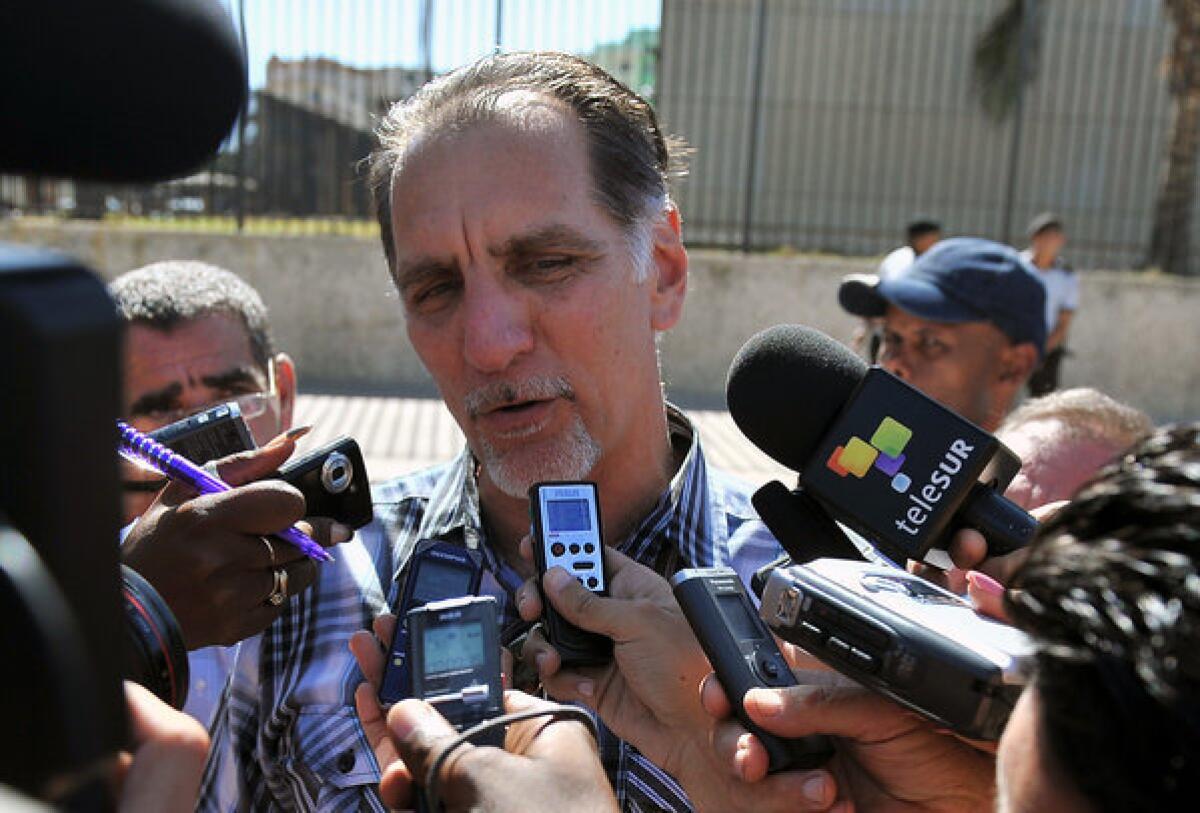Man convicted of spying in the U.S. is allowed to return to Cuba

- Share via
MEXICO CITY -- A man convicted of spying in the U.S. for the Castro regime has been allowed to return to Cuba after more than a decade in an American prison, and on Monday he began the paperwork to make his homecoming permanent (link in Spanish).
Rene Gonzalez, one of five Cubans whose incarceration in the U.S. became a cause celebre in Cuba and around the world, is the first of the group to be freed.
As part of the deal for him to remain in Cuba, Gonzalez, a dual U.S.-Cuban citizen (he was born in the United States to Cuban parents), had to renounce his U.S. citizenship.
On Monday, he went to the U.S. Interests Section in Havana, the office that handles U.S. affairs in countries such as Cuba with which Washington has no diplomatic ties, and formally filed the request for voluntary annulment of citizenship, reports from the island said. He waved to onlookers who shouted his name, the Associated Press reported from Havana.
Gonzalez, now 56, was arrested in Florida in 1998, convicted of espionage and sentenced to 13 years in prison. He was released in 2011. But he was ordered to remain in the U.S. on parole for an additional three years.
Last month, he was allowed to travel to Cuba to attend his father’s funeral. Last week, U.S. District Judge Joan Lenard in Miami said Gonzalez could remain in Cuba permanently if he gave up his U.S. citizenship. She ruled after the federal government indicated it would no longer object.
“It’s a lot of emotions coming together,” Gonzalez said in a radio interview (link in Spanish) Monday before heading to the U.S. Interests Section.
The case of the Cuban Five -- “heroes” at home, “terrorists” in the U.S. -- has been a volatile issue dividing Washington and Havana. The convictions were at one point thrown out by an appeal court that said the men could not have gotten a fair trial in a southern Florida “tainted” by anti-Castro hatred; the convictions were later reinstated, and the U.S. Supreme Court declined to hear the case, the final recourse for the five.
It also came to embroil the case of Alan Gross, an American subcontractor who said he was in Cuba to distribute computers but was arrested and convicted by the Cubans of espionage. He is serving a 15-year sentence, and Havana has offered to consider trading him for the Cuban Five -- a proposition the U.S. has rejected, saying the cases should not be linked.
Gonzalez and his four codefendants were intelligence agents sent to the U.S. to keep tabs on radical Cuban exile groups, the Cuban government has said. But they were arrested by U.S. authorities and in 2001 convicted of spying on U.S. military installations and other charges. One member of the group, Gerardo Hernandez, is serving two life sentences for allegedly supplying information that enabled the Cuban air force to shoot down and kill four pilots working for a Miami-based Cuban exile organization.
ALSO:
Cuba’s apparent successor to Castro was carefully groomed
Cubans no longer need special exit permit to travel off island
Thousands in Russia demand new elections, release of prisoners
More to Read
Sign up for Essential California
The most important California stories and recommendations in your inbox every morning.
You may occasionally receive promotional content from the Los Angeles Times.










